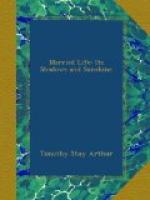As a husband, Henry Lane was a different being. His relation had changed, and his exterior changed correspondingly. Amanda was his wife; and as such she must be, in a certain sense, under him. It was his judgment that must govern in all matters; for her judgment, in the affairs of life, was held in light estimation. Moreover, as a man, it was his province to control and direct and her duty to look to him for guidance.
Yet, for all this, if the truth must be told, the conclusions of Amanda’s mind were, in ordinary affairs, even more correct than her husband’s judgment; for he was governed a great deal by impulses and first impressions, instead of by the reason of which he was so proud, while she came naturally into the woman’s quick perceptions of right and propriety. This being the case, it may readily be seen that there was a broad ground-work for unhappiness in the married state. Amanda could not sink into a mere cipher; she could not give up her will entirely to the guidance of another, and cease to act from her own volitions.
It took only a few months to make the young wife feel that her position was to be one of great trial. She was of a mild and gentle character, more inclined to suffer than resist; but her judgment was clear, and she saw the right or wrong of any act almost instinctively. Love did not make her blind to every thing in her husband. He had faults and unpleasant peculiarities, and she saw them plainly, and often desired to correct them. But one trial of this kind sufficed to keep her silent. He was offended, and showed his state of mind so plainly, that she resolved never to stand in that relation to him again.
As time progressed, the passiveness of Amanda encouraged in Lane his natural love of ruling. His household was his kingdom, and there his will must be the law. In his mind arose the conceit that, in every thing, his judgment was superior to that of his wife: even in the smaller matters of household economy, he let this be seen. His taste, too, was more correct, and applied itself to guiding and directing her into a proper state of dressing. He decided about the harmony of colours and the choice of patterns. She could not buy even a ribbon without there being some fault found with it, as not possessing the elements of beauty in just arrangements. In company, you would often hear him say—“Oh, my wife has no taste. She would dress like a fright if I did not watch her all the time.”
Though outwardly passive or concurrent when such things were said, Amanda felt them as unjust, and they wounded her more or less severely, according to the character of the company in which she happened at the time to be; but her self-satisfied husband saw nothing of this. And not even when some one, more plainly spoken than others, would reply to such a remark—“She did not dress like a fright before you were married,” did he perceive his presumption and his errors.




